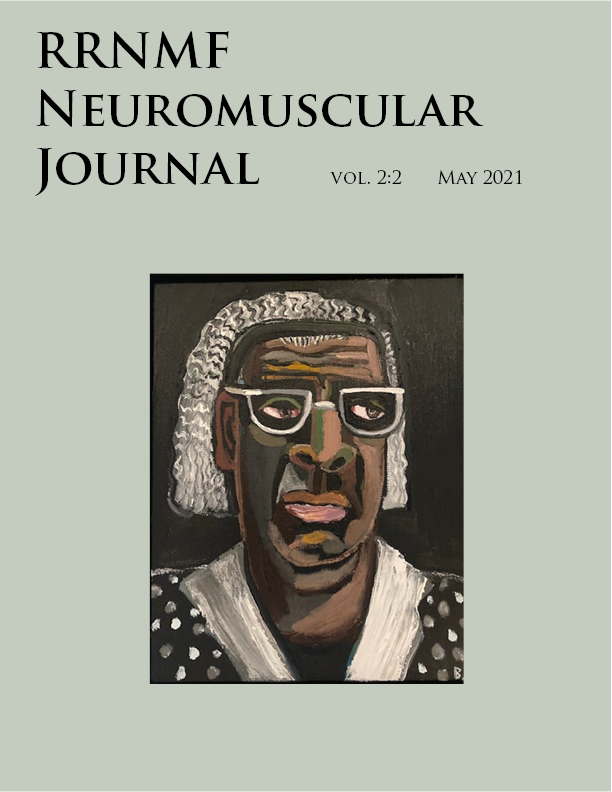Effect of the COVID-19 Pandemic on Neurology Trainees' Education and Practice
DOI:
https://doi.org/10.17161/rrnmf.v2i2.14994Keywords:
PPE = Personal Protective Equipment; COVID-19=Coronavirus Disease 2019 (COVID-19), Resident, Trainee, EducationAbstract
Objective: The COVID-19 pandemic has rapidly changed the neurology training landscape. The study was designed to assess the effects of COVID-19 on the education, practice, and well-being of US neurology trainees.
Methods: A 36-item survey was distributed to neurology residents and fellows in the United States through various media platforms.
Results: Over an 8-week period, 286 responses were received, 285 were included. Almost all (93%) trainees were in an academic setting. Tele-neurology use by trainees was minimal (13%) prior to the pandemic; however, during the pandemic 91% reported using it. A majority (84%) of trainees did not receive training in tele-neurology prior to the pandemic. Most trainees felt that the pandemic impacted their education with fewer lectures being available, and 77% resorted to getting lectures from outside institutions. Tele-lecturing with video conferencing was the most common mode of education during the pandemic. A third (33%) of trainees felt that they did not have enough PPE during the pandemic. Most trainees worried about exposing themselves or their families to COVID-19, and had increased stress levels.
Conclusion: This study demonstrates that most neurology trainees had no training nor exposure to tele-neurology prior to the pandemic, and were rapidly thrusted into tele-neurology during the pandemic. Trainees had an overall negative educational impact, and were stressed during the pandemic. Use of technology and availability of outside institutions’ lectures were most helpful to continue with educational activities during this time.
Downloads
References
Machhi J, Herskovitz J, Senan AM, et al. The natural history, pathobiology, and clinical manifestations of SARS-CoV-2 infections. J Neuroimmune Pharmacol 2020;15:359-386.
Estrada E. COVID-19 and SARS-CoV-2. modeling the present, looking at the future. Phys Rep 2020;869:1-51.
Sohrabi C, Alsafi Z, O'Neill N, et al. World health organization declares global emergency: A review of the 2019 novel coronavirus (COVID-19). Int J Surg 2020;76:71-76.e 2019 novel coronavirus (COVID-19). Int J Surg 2020;76:71-76.
https://covid.cdc.gov/covid-data-tracker/#cases_casesinlast7days
Nicola M, Alsafi Z, Sohrabi C, et al. The socio-economic implications of the coronavirus pandemic (COVID-19): A review. Int J Surg 2020;78:185-193.
Agarwal S, Sabadia S, Abou-Fayssal N, Kurzweil A, Balcer LJ, Galetta SL. Training in neurology: Flexibility and adaptability of a neurology training program at the epicenter of COVID-19. Neurology 2020;94:e2608-e2614.
Kwon YS, Tabakin AL, Patel HV, Backstrand JR, Jang TL, Kim IY, Singer EA. Adapting urology residency training in the COVID-19 era. Urology 2020;141:15-19.
AlGaeed M, Grewal M, Richardson PK, Leon Guerrero CR. COVID-19: Neurology residents' perspective. J Clin Neurosci 2020;78:452-453.
Grossman SN, Han SC, Balcer LJ, Kurzweil A, Weinberg H, Galetta SL, Busis NA. Rapid implementation of virtual neurology in response to the COVID-19 pandemic. Neurology 2020;94:1077-1087.
Crawford BE, Kahn MJ, Gibson JW, Daniel AJ, Krane NK. Impact of hurricane katrina on medical student academic performance: The tulane experience. Am J Med Sci 2008;336:142-146.
Yeo CJJ, Román GC, Kusnerik D, et al. Trainee responses to hurricane harvey: Correlating volunteerism with burnout. Front Public Health 2018;6:224.
Hatcher-Martin JM, Adams JL, Anderson ER, et al. Telemedicine in neurology:Telemedicine work group of the american academy of neurology update. Neurology 2020;94:30-38.
Levine SR, Gorman M. "Telestroke”: The application of telemedicine for stroke. Stroke 1999;30:464-469.
LaMonte MP, Bahouth MN, Hu P, et al. Telemedicine for acute stroke: Triumphs and pitfalls. Stroke 2003;34:725-728.
Hanson RE, Truesdell M, Stebbins GT, Weathers AL, Goetz CG. Telemedicine vs office visits in a movement disorders clinic: Comparative satisfaction of physicians and patients. Mov Disord Clin Pract 2018;6:65-69.
Rasmusson KA, Hartshorn JC. A comparison of epilepsy patients in a traditional ambulatory clinic and a telemedicine clinic. Epilepsia 2005;46:767-770.
Geronimo A, Wright C, Morris A, Walsh S, Snyder B, Simmons Z. Incorporation of telehealth into a multidisciplinary ALS clinic: Feasibility and acceptability. Amyotroph Lateral Scler Frontotemporal Degener 2017;18:555-561.
Shafqat S, Kvedar JC, Guanci MM, Chang Y, Schwamm LH. Role for telemedicine in acute stroke. feasibility and reliability of remote administration of the NIH stroke scale. Stroke 1999;30:2141-2145.
Morrell K, Hyers M, Stuchiner T, et al. Telehealth stroke dysphagia evaluation is safe and effective. Cerebrovasc Dis 2017;44:225-231.
Abdolahi A, Scoglio N, Killoran A, Dorsey ER, Biglan KM. Potential reliability and validity of a modified version of the unified parkinson's disease rating scale that could be administered remotely. Parkinsonism Relat Disord 2013;19:218-221.
Abdolahi A, Bull MT, Darwin KC, Venkataraman V, Grana MJ, Dorsey ER, Biglan KM. A feasibility study of conducting the montreal cognitive assessment remotely in individuals with movement disorders. Health Informatics J 2016;22:304-311.
Downloads
Published
Issue
Section
License
Copyright (c) 2021 Amtul Farheen

This work is licensed under a Creative Commons Attribution-NonCommercial-NoDerivatives 4.0 International License.

